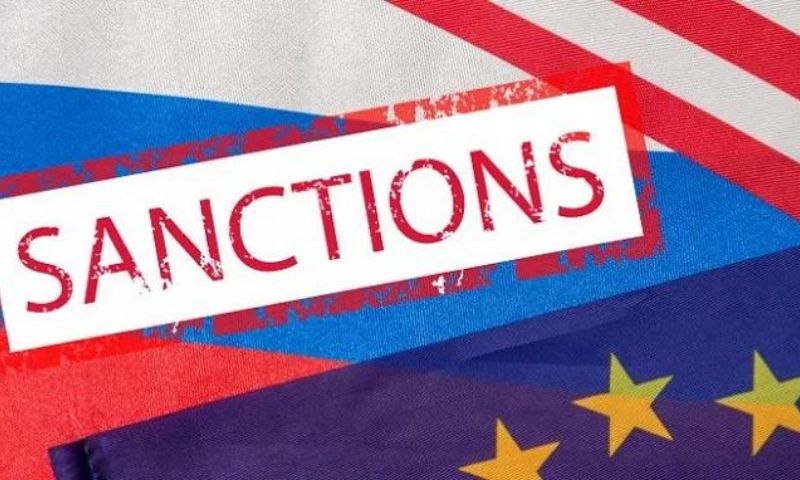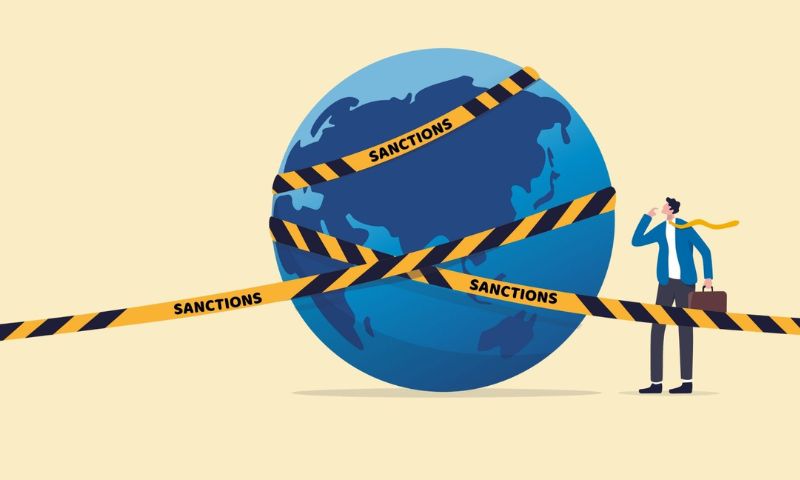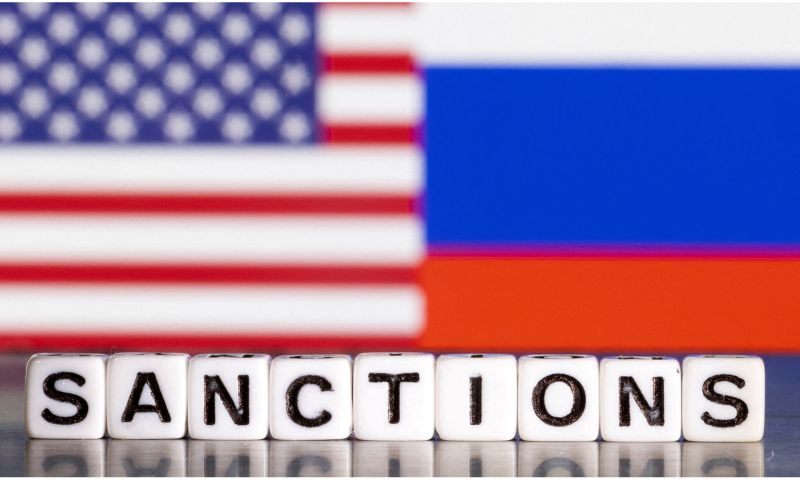War and Economic Sanctions: they’re not merely buzzwords for the evening news. They reshape our global trade map, touching lives far from the conflict zones. As an expert dissecting these complex tools, I bear witness to the ripples they create across seas and sectors. Beneath their surface lies a web of laws and decisions that construct or constrain markets worldwide. Walk with me through the intricate realities of sanctions — their foundation in modern warfare, the shock to global trade, the delicate threads of humanitarian and diplomatic outcomes, and the strategies defining their future. You might find the world much smaller and more interconnected than you ever imagined.
The Foundation of Economic Sanctions in Modern Warfare
The Mechanism of Sanctions: From Embargoes to Financial Penalties
Ever wonder how countries fight without using guns? They often use economic sanctions. Sanctions can block trade, stop money flow, and make things hard for nations. Countries use them to say, “Hey, what you’re doing is not okay.”
Do sanctions stop countries from fighting? Yes, sometimes they do. Sanctions make it tough for countries to get money and goods they need. For example, if a country can’t sell its oil because of an oil embargo, it loses money it needs for things like buying weapons or taking care of its people. This is how sanctions can work as a strong warning.
But sanctions can hurt more than just the target country. They can also mess up trade relations and supply chains across the world. When one country faces financial penalties or trade restrictions, it’s not just them who suffer. It’s like when a big machine breaks a part. Even though just one piece broke, the whole machine might stop working right.
Legal Framework: International Law and the Authorization of Sanctions
Now, can just any country decide to punish another with sanctions? Actually, there are rules. International law sets the stage for when and how sanctions can be used. Bodies like the United Nations (UN) often have to say “yes” to sanctions. They make sure it’s fair and needed. An embargo or asset freeze must align with international laws to be legit.
Countries also watch out for their own interests. They won’t allow sanctions if it hurts them too much. Retaliatory tariffs or import bans in war times are used to fight back. The idea is to make warfare costly in another way, hitting the pocket where it hurts. Blocking SWIFT banking can stop money from moving, which can really impact a country.
So when sanctions are in place, it’s not just about stopping trade or money. It’s about making it costly for bad actions in war. It’s a way to control conflict and make countries play by the rules. By hurting the economy, sanctions tell countries to stop and think before they act. It’s a peace method that doesn’t need a single shot fired, but it must be done right and fair.

The Ripple Effect of Sanctions on Global Trade and Economy
Disrupting Supply Chains and the Cost to the Global Market
When big countries fight, smaller ones feel the pain. Take sanctions, for example. Sanctions can block trade from one place to another. This block hurts how things we use every day are made and sent across the world.
What are the impacts of economic sanctions on global trade?
Sanctions can make it hard to buy and sell things between countries. They can stop parts needed to make goods from moving across borders. This halt can lead to factories slowing down or stopping work. It can also make it tough for people to get stuff they need, like food or medicine.
Sanctions can do more than just stop things from moving. They can also make it costly for businesses to run. Sometimes, finding new ways to get goods can cost a lot. This cost can lead to higher prices for everyone.
Targeted Sanctions and Their Impact on Sectoral Economies
Not all sanctions hit every part of a country’s economy. Some are like a sharp knife, cutting into just one piece. These are called “targeted sanctions.” They aim at specific areas, like oil or banking.
How do targeted sanctions work?
Targeted sanctions focus on certain parts of an economy. They might stop a country from selling its oil or prevent a bank from doing business overseas. These moves are meant to push leaders to change, without hurting regular folks too much.
But even sharp cuts can have wide effects. For example, if an oil embargo hits a country, it’s not just about that country’s oil anymore. The world market feels the change too. Oil prices can go up, affecting how much you pay for gas and other things.
Sometimes, the people making these sanctions have to think hard about what to do. They want to avoid a big mess in the economy but still be tough on bad behavior. It’s not an easy choice.
In the end, sanctions touch more than just the targeted country. They can shake up trade all over the globe. The ripples can spread far, changing prices, jobs, and how nations get along. It’s a big deal, and we all feel it, one way or another.
Navigating the Consequences: Humanitarian and Diplomatic Repercussions
Assessing Humanitarian Outcomes: Beyond the Economic Numbers
When countries fight, they often use economic sanctions. This means one country will stop trading certain goods with another, thinking this will force them to change their ways. But what really happens when these sanctions are in place?
In my work, I’ve seen plenty of people struggling because of trade restrictions during conflict. Shops may have fewer goods, prices might go up, and workers can lose their jobs. The ripple effects touch everyone — from farmers who can’t sell their crops, to sick people who can’t get medicine.
This impact of economic sanctions goes past just numbers. We see families suffer and children who can’t go to school because their parents can’t afford it. Blocked international trade can hurt people, and sometimes, it’s the folks who are not even part of the fight.
The Diplomatic Dance: Balancing Sanction Policies with International Relations
Now, how do these sanctions fit into the big world picture? It’s tricky. Nations want to use sanctions as a warning, like saying, “Hey, stop that, or else!” Asset freezes are one way they do this. They tell someone, “We have your money, and you can’t use it until you play nice.”
But things can get heated quickly. One country’s sanctions might lead to another’s tariffs, which is like adding fees on goods from the first country. Throw in an oil embargo, and you can picture how tense things get.
The key is to keep talking. Nations try to work out stuff so that sanctions do their job without making everything worse. They dance this careful dance, hoping to maintain peace and balance.
When I look at international relations and sanctions, it’s all about finding that balance. Do the sanctions make things safer, or do they cause more trouble? It’s my job to untangle these threads and shed light on what’s going on.
Sanctions can change the tide of war but they should never be set without thinking about the humans caught in the middle. Sanctions are a tool, not the only answer. They must be used with care, always keeping the people and the big picture in mind.
And this is where it gets personal. When I see the faces of those affected, I am reminded of why we must strive for a world where we settle our differences without the need for economic warfare.

Strategies, Compliance, and the Future of Sanctions
Evading the Net: Sanction Evasion and the Use of Smart Sanctions
When a country faces economic sanctions, it often tries to dodge them. They might do this by using other money paths that sanctions don’t block. This is called sanction evasion. Sometimes, they trade with friends who don’t back the sanctions. Other times, they hide what they’re selling. They might even change ships at sea to confuse trackers.
Countries use smart sanctions to avoid these tricks. Unlike a big net that catches all, smart sanctions act like a spear, hitting just the bad actors. They freeze assets of specific people or companies, not the whole country. This way, they aim to cut off the bad guys’ money without hurting everyday folks.
Sanctions Compliance and the Role of International Bodies in Enforcement
Following the rules, or sanctions compliance, is vital for countries and businesses. If they don’t, they might face big fines or get cut off from global money systems. That’s where international groups come in. The United Nations (UN) and the European Union (EU) set rules for sanctions and watch to make sure everyone plays fair.
These bodies also help match up sanction rules among countries, so bad actors can’t slip through the cracks. A tough part for businesses is making sure they follow all the different rules. They must check their deals against lists of banned trade partners. And when war erupts, this becomes even harder. War can bring new bans on trade, making old deals suddenly off-limits.
Following these rules isn’t just good behavior; it helps hold aggressive countries in check. But we also have to look out for the regular people caught in the middle. We need to protect aid, medicine, and food from getting blocked. This is part of keeping the world’s trade and money systems running smooth, even during rough times.
We’ve explored how sanctions work, their legal backdrop, and their broad reach. We saw how these economic tools can disrupt markets and supply chains, hitting sectors hard. But it’s more than money; real people feel these effects. This balance of power and humanity is key in shaping policy.
As we look to the future, we see the expert dance of diplomacy and the push for smart, fair sanctions. Compliance is crucial, as is the role of global bodies in maintaining order. Sanctions will evolve, but their aim remains clear: to be a firm yet fair hand in international conflicts. Let’s ensure they serve justice without harming the innocent.
Q&A :
How do war and economic sanctions impact the global economy?
Economic sanctions and conflicts can significantly disrupt the flow of trade, investment, and financial markets on a global scale. Sanctions, which are imposed to exert political pressure, can stagnate economic growth in target nations, raise production costs, and impede access to resources. Similarly, war can damage critical infrastructure, hinder trade routes, and increase uncertainty, leading to volatility in global stock markets and commodities prices. Businesses worldwide may face supply chain disruptions, leading to inflation and scarcity of goods.
What are the long-term effects of economic sanctions on a nation’s economy?
Over an extended period, economic sanctions can have profound effects on a targeted nation’s economy. They can result in a decline in GDP, devaluation of the currency, soaring inflation rates, and an increase in unemployment. Sanctions can also worsen living standards by limiting access to necessary goods, healthcare, and technology. Furthermore, prolonged economic isolation can hinder a nation’s development by restricting foreign investments and causing long-term damage to various industries.
Can economic sanctions lead to war?
While economic sanctions are generally intended to pressure governments without resorting to armed conflict, they can sometimes escalate tensions and contribute to the outbreak of war. If a nation views sanctions as a direct threat to its sovereignty or economic survival, it may resort to military action as a countermeasure. Sanctions can exacerbate political hostility and provoke aggressive nationalism, potentially leading to armed conflict, especially when diplomatic avenues are exhausted.
How do countries typically respond to economic sanctions?
Countries targeted by economic sanctions often seek ways to mitigate their impact. These can include diversifying their economies, finding alternative trade partners, developing domestic industries to replace imports, or resorting to black market trade. Some nations may also engage in diplomatic negotiations to have sanctions lifted. In contrast, others may retaliate with their own sanctions or increase their geopolitical leverage to counterbalance the imposed restrictions.
What role do international organizations play in enforcing economic sanctions?
International organizations like the United Nations (UN) and the European Union (EU) often play significant roles in enforcing economic sanctions. They can coordinate member states to implement collective sanctions, ensuring a unified and powerful economic front. These organizations also monitor compliance with sanctions and may offer humanitarian exceptions to minimize the negative impacts on civilian populations. Additionally, they provide forums for diplomatic dialogue with the goal of resolving the underlying conflicts that led to the imposition of sanctions.




